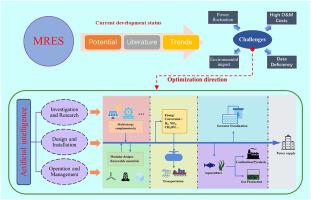海洋可再生能源:进展、挑战和可扩展可持续性的途径
IF 9.4
1区 工程技术
Q1 ENERGY & FUELS
引用次数: 0
摘要
电力需求的不断增长和气候变化的不利影响日益加剧,迫切需要推进海洋可再生能源(MRE)的开发和利用。从2011年到2024年,MRE开发取得了显著的技术进步。本研究分析了这14年间的相关研究,全面回顾了当前的发展、存在的挑战和优化策略,特别强调了人工智能(AI)在该领域的应用和潜力。在各种MRE类型中,海上风能的发展水平最为成熟,而其他能源形式的转换效率和经济可行性相对较低。混合可再生能源系统(HRES)和新型储能技术(氢、氨、甲醇)可以有效解决可再生能源系统固有的发电波动和剩余电力生产问题。与MRE开发相关的高成本一直是限制该领域进展的主要制约因素,而人工智能(AI)在降低成本和提高发电效率方面显示出巨大的潜力。然而,在缺乏足够高质量数据的应用场景中,需要结合第一性原理建模等方法。此外,将循环经济理论与生命周期评估(LCA)相结合应用于大型MRE发电平台或发电厂是另一个关键的优化策略。随着未来MRE电力设施不可避免地趋向于更高的效率和更大的规模,调查这一进展对海洋生态系统的环境影响是未来研究中不可忽视的重要工作。本文章由计算机程序翻译,如有差异,请以英文原文为准。

Marine renewable energy: Progress, challenges, and pathways to scalable sustainability
The escalating demand for electricity and increasingly adverse impacts of climate change necessitate urgent advancement in the development and utilization of Marine Renewable Energy (MRE). From 2011 to 2024, significant technological progress has been achieved in MRE exploitation. This study analyzes relevant studies during this 14-year period, providing a comprehensive review encompassing current developments, existing challenges, and optimization strategies, with particular emphasis on artificial intelligence (AI) applications and potential within this field. Among various MRE types, offshore wind energy demonstrates the most mature development level, while other energy forms exhibit relatively lower conversion efficiency and economic viability. The inherent power generation fluctuations and surplus electricity production in renewable energy systems can be effectively addressed through Hybrid Renewable Energy system (HRES) and novel energy storage technologies (hydrogen, ammonia, methanol). The high costs associated with MRE development have consistently been a primary constraint limiting progress in this field, while artificial intelligence (AI) demonstrates significant potential for reducing costs and enhancing power generation efficiency. However, in application scenarios lacking sufficient, high-quality data, it is necessary to combine methods such as first-principles modeling. Additionally, the integration of circular economy theory with life cycle assessment (LCA) applied to large-scale MRE power generation platforms or farms is another key optimization strategy. As future MRE power facilities inevitably trend toward higher efficiency and larger scales, investigating the environmental impacts of this progression on marine ecosystems constitutes essential work that cannot be overlooked in future research.
求助全文
通过发布文献求助,成功后即可免费获取论文全文。
去求助
来源期刊

Energy
工程技术-能源与燃料
CiteScore
15.30
自引率
14.40%
发文量
0
审稿时长
14.2 weeks
期刊介绍:
Energy is a multidisciplinary, international journal that publishes research and analysis in the field of energy engineering. Our aim is to become a leading peer-reviewed platform and a trusted source of information for energy-related topics.
The journal covers a range of areas including mechanical engineering, thermal sciences, and energy analysis. We are particularly interested in research on energy modelling, prediction, integrated energy systems, planning, and management.
Additionally, we welcome papers on energy conservation, efficiency, biomass and bioenergy, renewable energy, electricity supply and demand, energy storage, buildings, and economic and policy issues. These topics should align with our broader multidisciplinary focus.
 求助内容:
求助内容: 应助结果提醒方式:
应助结果提醒方式:


